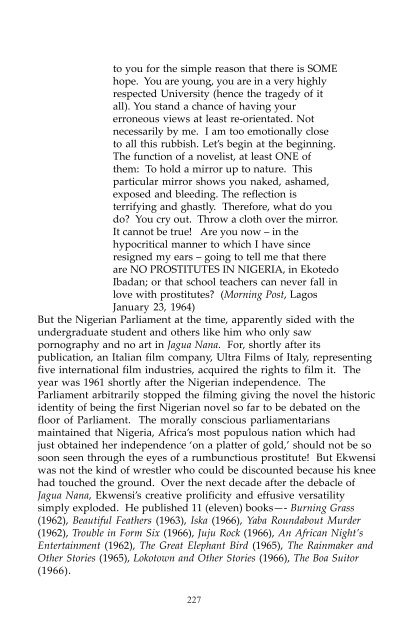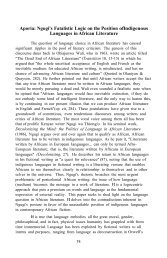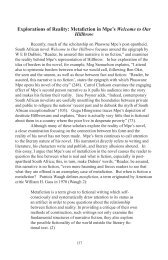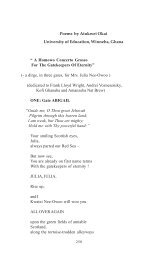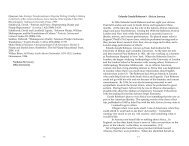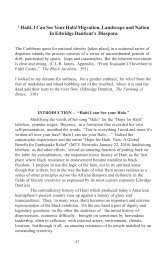JALA Winter-Spring 2008-Vol 2 No 1 - African Literature Association
JALA Winter-Spring 2008-Vol 2 No 1 - African Literature Association
JALA Winter-Spring 2008-Vol 2 No 1 - African Literature Association
Create successful ePaper yourself
Turn your PDF publications into a flip-book with our unique Google optimized e-Paper software.
to you for the simple reason that there is SOME<br />
hope. You are young, you are in a very highly<br />
respected University (hence the tragedy of it<br />
all). You stand a chance of having your<br />
erroneous views at least re-orientated. <strong>No</strong>t<br />
necessarily by me. I am too emotionally close<br />
to all this rubbish. Let’s begin at the beginning.<br />
The function of a novelist, at least ONE of<br />
them: To hold a mirror up to nature. This<br />
particular mirror shows you naked, ashamed,<br />
exposed and bleeding. The reflection is<br />
terrifying and ghastly. Therefore, what do you<br />
do? You cry out. Throw a cloth over the mirror.<br />
It cannot be true! Are you now – in the<br />
hypocritical manner to which I have since<br />
resigned my ears – going to tell me that there<br />
are NO PROSTITUTES IN NIGERIA, in Ekotedo<br />
Ibadan; or that school teachers can never fall in<br />
love with prostitutes? (Morning Post, Lagos<br />
January 23, 1964)<br />
But the Nigerian Parliament at the time, apparently sided with the<br />
undergraduate student and others like him who only saw<br />
pornography and no art in Jagua Nana. For, shortly after its<br />
publication, an Italian film company, Ultra Films of Italy, representing<br />
five international film industries, acquired the rights to film it. The<br />
year was 1961 shortly after the Nigerian independence. The<br />
Parliament arbitrarily stopped the filming giving the novel the historic<br />
identity of being the first Nigerian novel so far to be debated on the<br />
floor of Parliament. The morally conscious parliamentarians<br />
maintained that Nigeria, Africa’s most populous nation which had<br />
just obtained her independence ‘on a platter of gold,’ should not be so<br />
soon seen through the eyes of a rumbunctious prostitute! But Ekwensi<br />
was not the kind of wrestler who could be discounted because his knee<br />
had touched the ground. Over the next decade after the debacle of<br />
Jagua Nana, Ekwensi’s creative prolificity and effusive versatility<br />
simply exploded. He published 11 (eleven) books—- Burning Grass<br />
(1962), Beautiful Feathers (1963), Iska (1966), Yaba Roundabout Murder<br />
(1962), Trouble in Form Six (1966), Juju Rock (1966), An <strong>African</strong> Night’s<br />
Entertainment (1962), The Great Elephant Bird (1965), The Rainmaker and<br />
Other Stories (1965), Lokotown and Other Stories (1966), The Boa Suitor<br />
(1966).<br />
227


